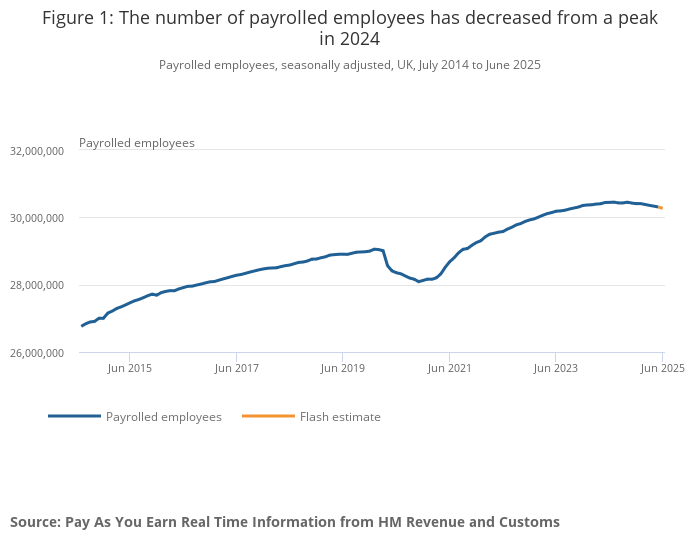31st July 2025
Last week’s figures from the ONS indicate that the number of payrolled individuals decreased further in June, following up steady falls during the first half of 2025. GDP has held steady so far, but do the payroll figures portray the reality that the majority of SMEs are facing, and is an official recession on the horizon?
Background – what’s happened?
The number of payrolled employees is forecast to have fallen by 41,000 in June 2025 – see graph opposite. This follows a fall of 25,000 in May, and brings the total reduction in the 12 months since June 2024 to 178,000.
The increase in Employer’s NICs, introduced in April, along with uncertainty over tariffs, stubborn inflation and higher interest rates all appear to have contributed to the inability or unwillingness of companies to keep hold of staff at the same levels over this timeframe.
The GDP figures, however, were strong for Q1 2025, and despite monthly declines in April and May, GDP growth remained positive in the three months to May showing 0.5% growth.
The payroll numbers indicate that the headline GDP figures don’t necessarily portray the reality facing companies across the whole of the UK economy. Indeed, as companies struggle to realise performance that justifies retaining staff on a net basis, there appears to be a disconnect between the reality on the ground, and the GDP figures often given as a proxy for the health of the economy

Which sectors are most heavily impacted?
Hospitality and retail have taken by far the largest hits, representing a loss of 175,000 payrolled employees between them. In contrast, the health and social work sector has added 70,000 jobs, in what is primarily a public-sector led area.
These labour-intensive sectors are being particularly impacted by the increased NICs.
The fall in payrolled employees in these sectors aligns with the results of the Business Insights and Conditions Survey (BICS – Business Insights and Conditions Survey), a fortnightly survey of thousands of UK businesses which asks owners what they are seeing on the ground.
Despite the positive GDP figures, this survey has consistently shown that a majority of business owners are experiencing reduced turnover on a regular basis, particularly in the SME space. Should we be placing more emphasis on surveys like this, particularly for SMEs, which ask business owners on the ground what they’re experiencing, rather than the GDP figures?
.png)
Will the fall in payrolled employees herald an official recession?
The chart below shows the seasonally adjusted movement in payrolled employees in the UK for the period 2014-2025 with shaded areas added indicating periods that the UK was officially in a recession.
The two recessions within the period for which data on payrolled employees is available were markedly different in nature, with the Covid recession of 2020 varying widely from the technical recession of 2022, which was linked to the energy crisis and period of high inflation at the time. Payrolled employees fell sharply during the Covid recession, whereas employment was not impacted in the recession of 2022.
What cannot be ignored however, is the fact that a consistently downward trend, as shown for 2025 to date, has not been seen for the time period in question, and could therefore indicate a recession is on the horizon.
.png)
How can we help your clients?
Whether or not the UK enters into an official recession, many companies are feeling the pain in the UK economy at present, as evidenced by the fall in payrolled employees. At Leonard Curtis we can help mitigate increasing employee costs by optimising cost structures across the business as a whole. Using our data-driven methodology, we assess every cost to uncover their drivers, and help companies re-shape processes and structures to minimise cost and maximise profitability.
Losing staff is sometimes a counter-productive means to reduce cost, as it can also curtail growth on the revenue side. Our balanced approach increases efficiency, and identifies core strengths to reinvest in, ensuring that cost reductions help companies focus on what they are best at and continue to grow.
We have experience across a wide range of industries and work with businesses of all sizes. If your clients are being impacted by increasing costs and letting staff go as a consequence, please contact Phil Lyons at phil.lyons@leonardcurtis.co.uk or on 07740 405364.
